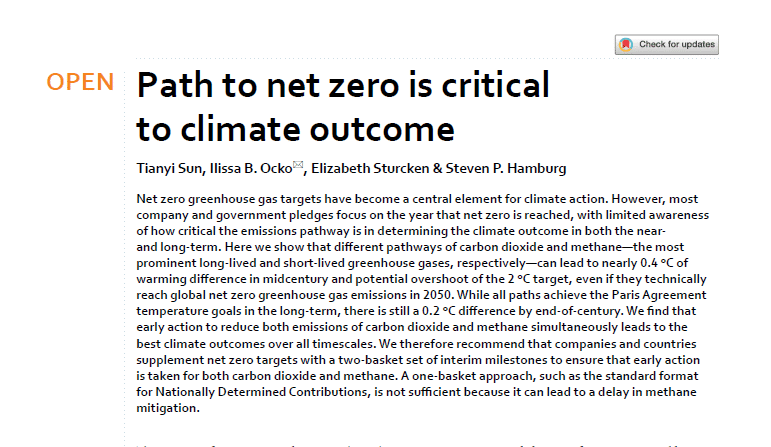
“We find that early action to reduce both emissions of carbon dioxide and methane simultaneously leads to the best climate outcomes over all timescales. We therefore recommend that companies and countries supplement net zero targets with a two-basket set of interim milestones to ensure that early action is taken for both carbon dioxide and methane. A one-basket approach, such as the standard format for Nationally Determined Contributions, is not sufficient because it can lead to a delay in methane mitigation.
“Studies have also identified multiple shortcomings of current net zero targets, and called for strategies for improvement. Some of those issues are a need for transparency relating to types of GHGs covered and metrics used; consistency in the accounting method for land-use emissions; clarity in definitions and terminology; distinction among carbon dioxide removals, reductions and avoidance; consideration of fairness regarding different timelines for achieving net zero among countries with a diversity of economic conditions; and concern over companies/countries using the long timeline of net zero targets to delay decarbonization
“Proposals to improve net zero targets include but are not limited to transparency in the scope of emissions regarding gas species, sources, and metrics; disclosure of contributions from emissions reductions, removals, and offsets; disclosure of fairness and adequacy of target timeline as required in the Paris Agreement Nationally Determined Contributions (NDCs); long-term roadmap of maintaining net zero or net negative emissions; and plans to monitor and manage carbon storage.”
Citation: Sun, Tianyi, Ilissa B. Ocko, Elizabeth Sturcken, and Steven P. Hamburg. “Path to net zero is critical to climate outcome.” Scientific reports 11, no. 1 (2021): 22173.
Schedule a call with us to receive a free demo of the Net-Zero Portal and learn how we can support your organization’s net-zero goals.
Website by SeriousOtters